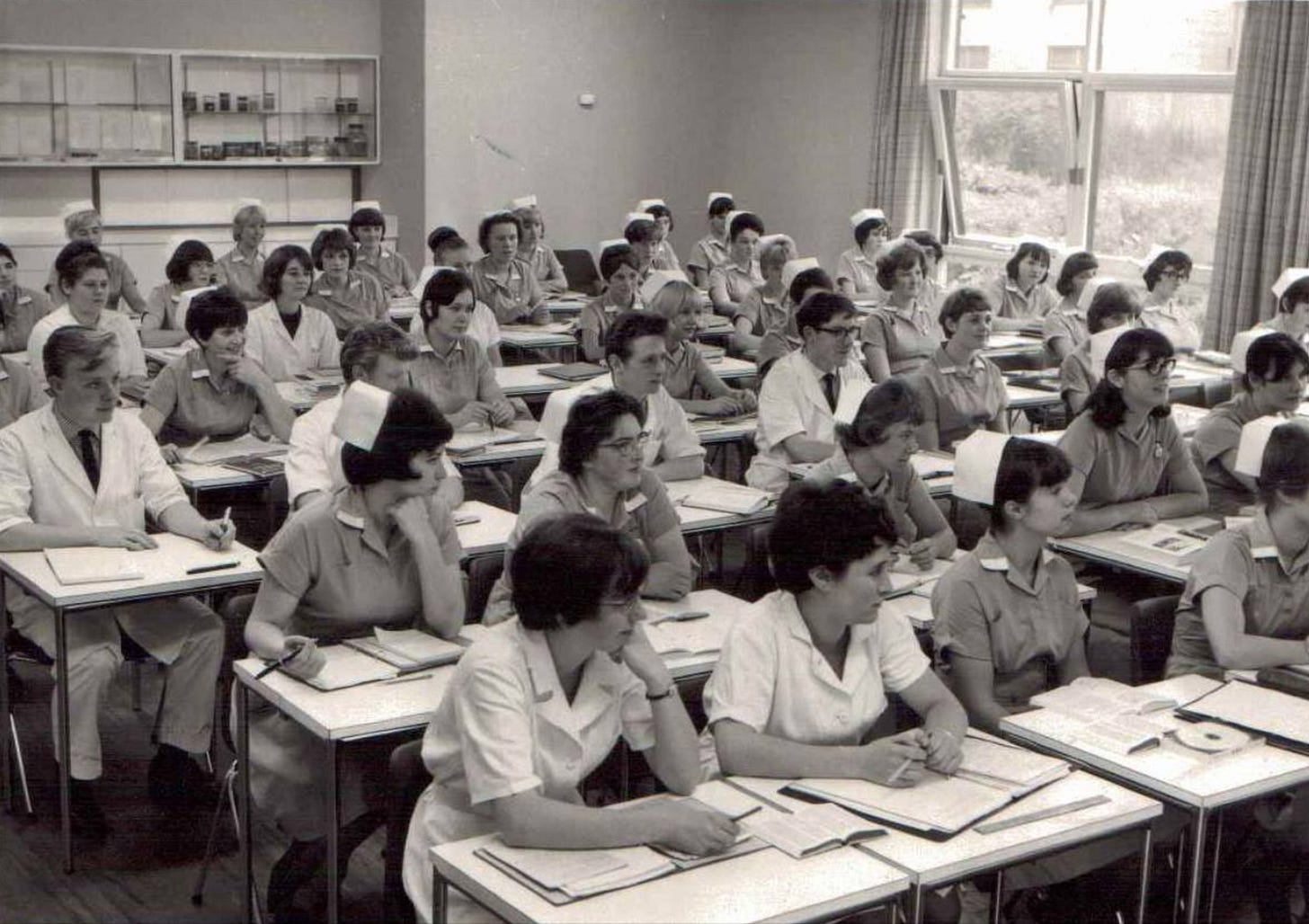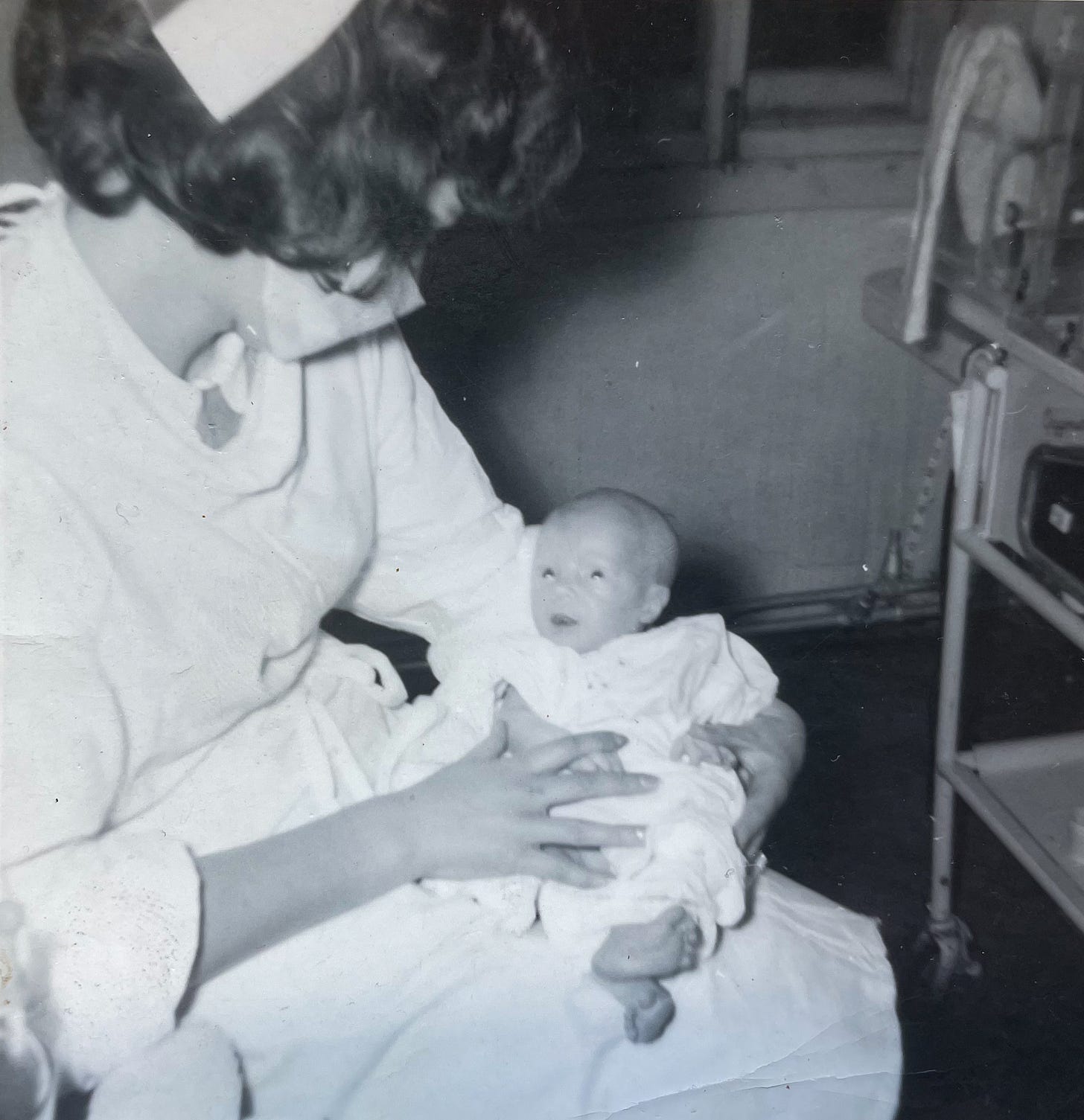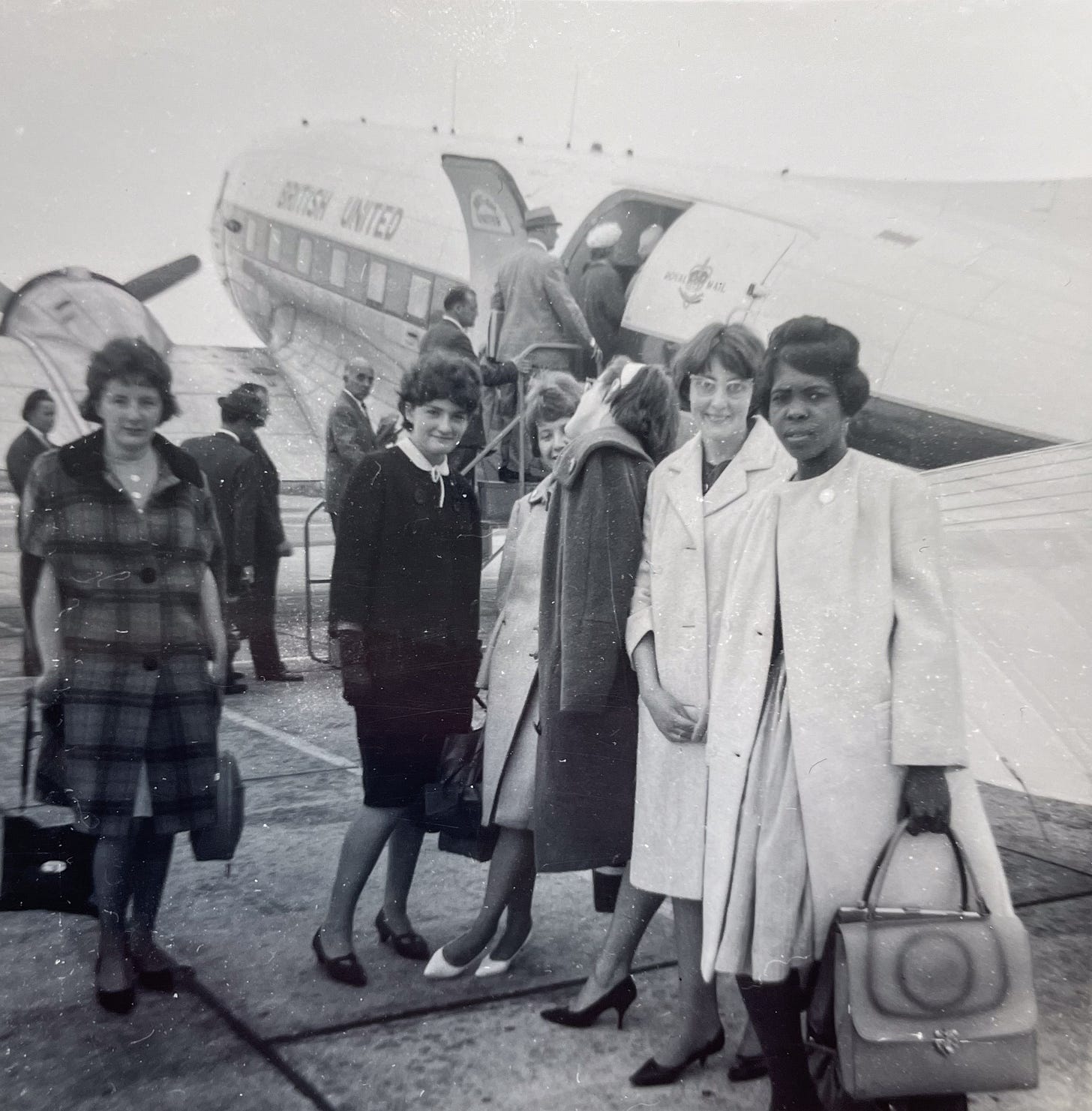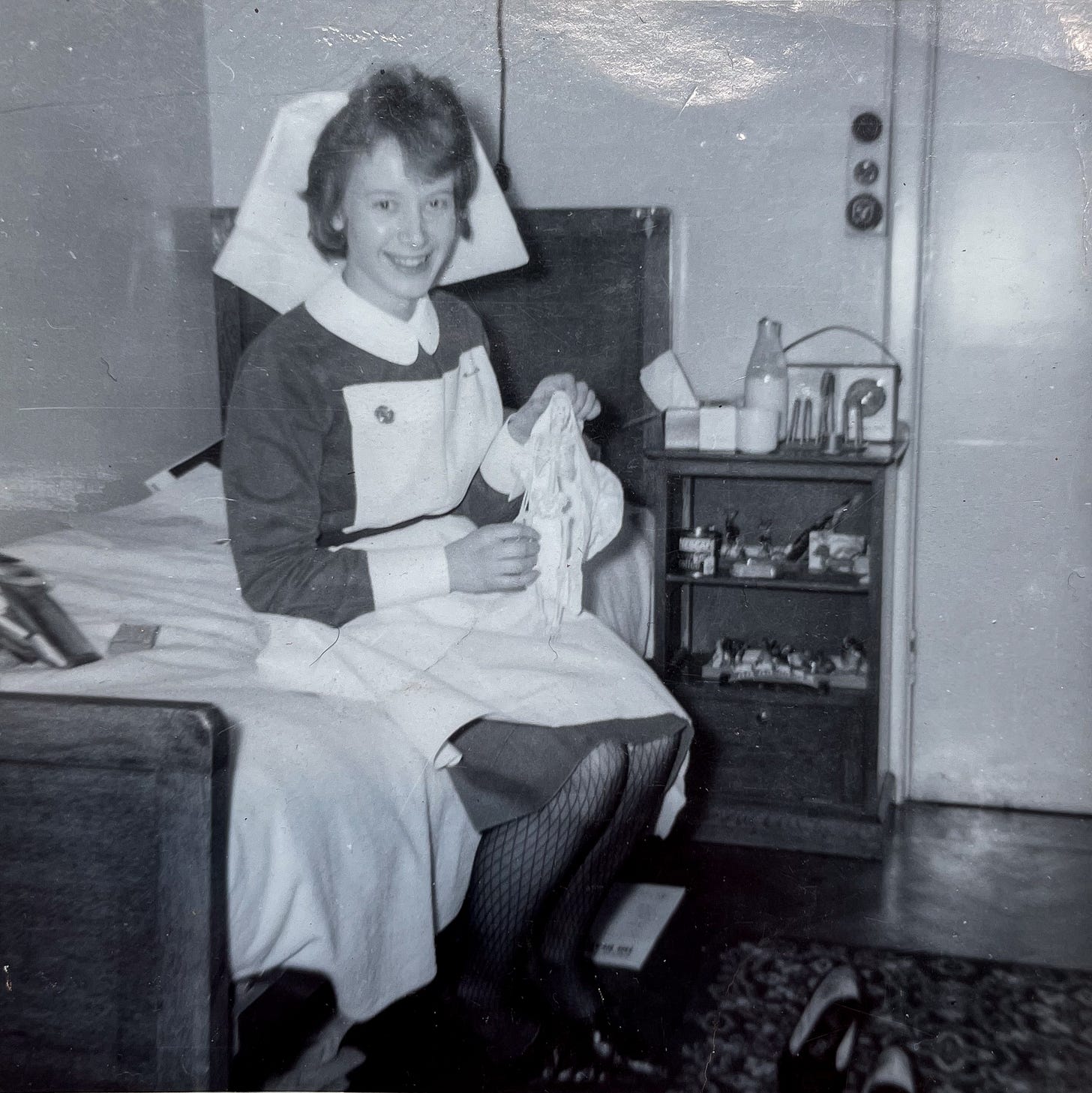Chapter Eight - General Nurses' Training
Planning for the Future
Previous chapter / Next chapter / Start at the beginning
Trish recovered from her illness in her old bedroom at her parents’ house. She appreciated the break, and the time with her mum, even though her relationship with her dad remained strained. Her brothers were teenagers, and when they weren’t at school they were out of the house with friends. Most days, Trish sat and chatted with her mum, watching her knit. Florence was an avid knitter. People in the neighbourhood knew her skill for making very detailed and brightly coloured dolls. They brought her bags of yarn to keep the production going. She had made and sold hundreds of dolls through the years. Trish had also learned to knit when she was little, but she lacked the patience to follow the intricate patterns required to make dolls like her mum. Instead, she watched and chatted. It was nice to have the time together.
As the weeks passed, Trish felt more like herself; her recent illness was behind her. She was keen to get back to life at the nurses’ residence. Although it was common for nurses to move out of residence after completing the training, it wasn’t necessary. Trish didn’t have money to rent a flat, even a shared flat with other girls, and she didn’t wish to return to her parents’ home on Crofton Crescent. She continued “living in” and moved into a new room at the far end of the residence with the other staff nurses. The new room was the same as her previous room, with one added feature, a heated towel rack! As it was the only source of heat in the room, it seemed like a real luxury.
Amidst preparations to write the State Examinations, Trish, and a few friends from her class chatted excitedly about taking a trip to celebrate graduation from nurses’ training. They discussed all the places they could go for a holiday away. The reality that they still had no money eventually dampened the excitement. Prior to passing the State Examination, and receiving their official registration, they continued to receive the student rate of pay in their new ward assignments. It was still a struggle to scrape together the funds for a shared bowl of fried rice on a night out. They knew that would soon change, though, and they eagerly anticipated the additional freedom a proper paycheck would afford them.
As soon as Trish and the other girls passed the State Examinations, they applied to the National Nurses’ Registration Board and soon received their official registration. They were now Registered Sick Children’s Nurses. Trish settled into Neo-Natal Surgical Unit (NNSU) and quickly got into the routine of a permanent role. The hospital had a new Matron, one who prioritized the care patients received, over careful adherence to tradition and rules. Working felt more relaxed, as rules such as “hair must be tucked into the nursing cap at all times,” fell by the wayside. The focus was on the work.
After becoming a Registered Nurse, and receiving the associated increase in pay, Trish reveled in the experience of receiving a salary that covered more than the barest essentials, even after paying for her room and board. For the first time in her life, she had actual spending money. She spent little of it, though. She and her group of friends were serious about taking a trip together, so they were all saving money. They still thought of it as their graduation trip, even though their graduation was now in the past. After several months of working, they had saved enough money for a trip to the Isle of Man. They flew there and spent a glorious, but soggy week together exploring the town of Douglas and the surrounding area. It rained hard for the week.
Not long after becoming a staff nurse, Trish had her 21st birthday. She had reached the legal age of majority for that time in the United Kingdom.
Trish celebrated her 21st birthday with a party at the Knotty Ash Community Hall on Prescot Road. Her dad organized the event, as it was customary to have a party for such an occasion. Trish didn’t much like being the center of attention, and was not looking forward to the party. The attendees were mostly family members, and her parent’s neighbours. Some of her friends from Alder Hey came along to offer moral support on the day.
For her birthday gift, Trish had asked her parents for an upside-down watch—a type nurses pinned to their aprons to easily check the time while keeping their hands free. Instead, she received a large, fancy transistor radio. Her brothers assured her it was a high-quality one. While Trish was grateful for the gift, she couldn’t help but wonder how much she would actually use it. She still needed the watch.
Trish and her friends continued to make travel plans together whenever their schedules and budget allowed it. Another memorable trip was when the friends went to Norfolk Broads and rented a houseboat. They spent a week drifting by towns and villages, churches, the odd castle, and relaxing in each other’s company. Although Trish was friends with several of her former classmates, she and Jean had become close friends. Jean had moved to St. Mary’s Hospital in Manchester after completing the training at Alder Hey. Despite the distance, they would often go on day trips together, exploring little towns and villages around Britain. Jean had a car, and that meant they had quite a large area they could explore when they had a free day. Trish’s favourite town was Chester. It wasn’t far from Liverpool; it was a short bus ride. She returned there often to wander through the streets and peek into the shops.
One year and a month after starting her job as a staff nurse in the NNSU, Trish learned there was going to be an opening for a Ward Sister position in the unit. She applied and was the successful candidate. She started in her new position as Night Sister in the NNSU unit.
To mark the occasion, her Aunt Marion and Uncle George gifted her the silver belt buckle that was worn by Ward Sisters. Trish was delighted to receive the buckle, she had not been sure she could afford to buy it for herself. The buckle was not only recognition of her achievement to become a Sister, it was a very special symbol of her identity as a nurse.
Although her staff nurses’ salary had afforded her more freedom than she had as a student, it wasn’t a lot. She prioritized saving for trips and outings with Jean, and other friends, rather than buying items for herself.
One such trip was a week-long vacation to Tenerife with another nurse, Vera. Although Trish and Vera weren’t close friends, they had time off together and booked a trip together. However, once they arrived at the hotel in Tenerife, it became clear they had different ideas about how to spend their holiday. Vera quickly became friendly with the hotel staff, especially the waiters in the hotel restaurant. Within a few nights, they invited her out to the local nightclubs, as she was happy to pay for their drinks and meals. She went out each subsequent night. Vera settled into a routine of sleeping through the day, waking up in the late afternoon for dinner, and heading out to party until the early hours. Trish had no interest in the nightclub scene. She was more interested in exploring the island than lounging by the pool or staying out late. She began taking walks into the nearby town to look around, and she found a cafe that she visited daily. One afternoon, while enjoying a coffee and watching the passersby, the cafe owners, a husband and wife, struck up a conversation with her. They lived in a small village up a mountain road and invited her to visit them and see the village. They even gave her detailed directions for the local bus she’d need to take.
The next day, carefully following their instructions, Trish boarded the crowded local bus. Unaccustomed to riding a bus so crowded, people were standing on the platform at the door and hanging on to the frame of the open door to steady themselves, she tried to take up the least amount of space possible. As the bus lurched into motion, she observed her fellow passengers. Most were carrying bulky bags, and one passenger had a box of live chickens that squawked from time to time. The road was steep and rocky, winding up the mountainside of the volcanic island. Trish was relieved when they finally reached the village, and she spotted the friendly couple waiting for her.
She spent a lovely day with them, learning about life in the mountain village and the nearby banana plantation. They cooked her a traditional meal, and she enjoyed dining with their family. When it was time to leave, they exchanged mailing addresses and promised to keep in touch by writing letters. The visit to the village, and spending the day with the couple turned what could have been a disappointing trip to Tenerife into a special experience.
With her new Ward Sister salary, Trish could soon save enough money to move out of the nurses' residence and into a small flat nearby. It was 1964, and at 23, she was earning a decent income, living independently, and thinking about her future. Up to that point, she had only worked with pediatric and neonatal patients, so she knew that expanding her training to include general nursing would open up more career opportunities. She considered several nursing schools, but her friend Jean, who was now living in Hull and working as a midwife, suggested she apply to a program there. Jean thought it would be great for them to spend time together on their days off. Following Jean’s advice, Trish applied to the Hull School of Nursing and was accepted. Although she had only lived in her flat for a few months, she happily gave it up in 1965 to move into the nurses' residence in Hull, where she started her general nursing training as a "visiting nurse."
Nurses' training in Hull was going through major changes in 1965. Princess Margaret had recently attended a ceremony officially opening the brand-new Hull School of Nursing, and Trish was part of the inaugural class. The new school combined the nursing programs from Hull Royal Infirmary, Kingston General Hospital, and Western General Hospital. As part of their training, Trish and her classmates would rotate through all three hospitals, moving from one nurses' residence to another with each new assignment. A new hospital building was also under construction, intended to combine the services of the three existing hospitals. The new building was expected to be completed in 1967.
The general nursing training program was three years, just like Trish’s pediatric program had been at Alder Hey. However, since she was already a Registered Sick Children’s Nurse, she received credit for parts of her pediatric training, especially the general first-year courses. With this credit, she only needed to complete 13 months of classes and ward work to finish the general nursing program. If she passed all the required elements, she could take the State Examination in General Nursing and qualify as a State Registered Nurse.

The atmosphere in Hull differed from what Trish had experienced at Alder Hey, where she had felt very much at home. In Hull, the Sisters treated her cooly, as did her classmates. Trish concluded that as she wore a different uniform as a “visiting nurse”, and stood out visually from her classmates, that drew attention. As well, the Sisters knew Trish had already worked as a staff nurse, and a Ward Sister. Perhaps they expected her to be a know-it-all, or strut around like she was better than the other students. Trish did none of those things, but it still took a long time for students and staff to warm up to her in Hull.
To escape the frosty interactions with her peers and superiors in Hull, Trish coordinated her time off with Jean. Jean was a fully qualified midwife and regularly had pupil midwives working with her to gain experience for their own qualifications. She lived near to Trish, in a house with two other midwives, and their respective pupil midwives.
Trish had no midwifery training herself, but she and Jean confided in each other about their respective work. Jean had two pupil midwives who were finishing their training with her. In a matter-of-fact way, Jean told Trish that when a call came for her to attend a home birth, Jean got in her car and drove to the home, and she left the students to attend on bicycles. Trish thought that was a bit mean and said as much. Jean thought it was just the way it was. She had a car; the students had bikes. That Jean had a car was unusual, most midwives responded to their patients on bikes, in all weather. The pupils needed to get used to it. Trish thought it was an unnecessary hardship for the pupils, but Jean was firm in her thinking.
Trish and Jean continued taking road trips around England, exploring places that others might overlook. While driving, Jean had a habit of spotting small side lanes and turning down them “just to see” what was there. The two friends often had lively arguments while planning their trips—debating where to go and what to do. Both had forceful personalities and weren’t afraid to speak their minds. Eventually, they agreed on a system: they would alternate days. One day, Jean would pick the activity, and Trish would join without complaining; the next day, Trish chose, and Jean would go along. This arrangement kept the peace and allowed them to keep exploring the country together. On Jean’s days, she almost always wanted to visit every antique shop in any town they passed. She would pick up and inspect what seemed like every item in the shop, check the price, then carefully put it back. She went through shop after shop in this manner, inspecting everything, and buying nothing. Trish found this puzzling and was often impatient, but she stuck to the agreement not to complain on Jean’s days.
They enjoyed finding interesting B&Bs to stay in. Sometimes they stayed in a castle or stately home, other times in a fisherman’s cottage. They also loved going to the coast. Some days, they would relax on the beach, while on others, they simply drove along the coastline and had a meal on the balcony of a small restaurant overlooking the North Sea. Every Christmas, they chose one Christmas fair at a castle or stately home to attend together.
One summer, Trish and Jean attended a “music and lights” performance at a castle. Throughout the evening an orchestra played on the castle lawns, and at dusk there was a light show. Attendees sat out on the lawns and listened to music. At intermission, most people ate a picnic dinner they had brought along in a basket. Some experienced patrons had bottles of wine chilling in the nearby pond. They tied a string and a float to the bottle, then left it in the pond to chill for dinner. It was very sophisticated. Into the evening, Trish and Jean sat on the carefully manicured lawns and watched the moon rise and carefully placed lights illuminate the castle. The two friends were surrounded by like-minded people enjoying the music and the mood. It was a lovely experience.
Back at Hull School of Nursing, Trish progressed through her training. There were differences between paediatric nursing and general nursing to be sure, and life lessons to be learned, such as the correct way to butter toast. When Trish did her rotation on the Diabetes Ward, she learned that the main intervention for managing diabetic patients was to weigh and restrict their carbohydrate intake. The Sister in charge of the ward insisted that every nurse learned how to butter bread and toast “the correct way”. She showed Trish how to butter the edges and the corners of the toast first, and the middle last. The Sister’s logic was diabetics had such a miserable, restricted diet, the least the nurses could do was make sure when a patient got to enjoy a slice of bread, it was well buttered!
During the 13 months of training in Hull, Trish and the other students had to move to a new hospital, and a new nurses’ residence three times, as they had ward rotations in each of the three major hospitals in the area. In each rotation, Trish thought she did as much of the cleaning and menial work as the brand-new, 18-year-old students, and perhaps more. She had a sense the Sisters were trying to put her in her place, as she had previous experience. She didn’t complain, and over time she was recognized as being capable and composed as she went about her work.
Trish completed her general training and wrote the State Examination. Again, she passed the exams and applied to the National Nurses’ Registration Board, this time to be qualified as a State Registered Nurse (SRN). Once qualified, she settled into a staff nurse position at Hull Royal Infirmary. Although her training was over, Trish still found the working atmosphere in Hull to be less harmonious than she experienced at Alder Hey. She had continued corresponding with the lovely couple she met in Tenerife a few years earlier. She noted with amusement that the first letter she received from them after forwarding her new Hull address was addressed to Trish Lewis at “Hell Royal Infirmary, Hell”. It wasn’t completely wrong.
Despite the less friendly atmosphere, the work itself was interesting, and Trish immersed herself in it. A Night Sister position became available soon after she received her registration, and Trish applied for it. The position was that of a Rounds Sister, who worked night shifts and covered several wards. The Rounds Sister did rounds throughout the night shift, checking in on the student nurses who were staffing the wards. Trish was awarded the position. When she had been a Ward Sister at Alder Hey, she had once overheard a senior student tell a more junior student, “Sister Lewis’s bark is worse than her bite, she’s good to work with.” Trish wondered what the students and other staff thought of her at Hull Royal Infirmary. It had taken a long time for Trish to feel comfortable in Hull, and she still often felt like an outsider. At least she hadn’t fallen victim to pranks, like some of the least popular Sisters had. In the residences, the laundry system for doctors and nurses differed from what she’d experienced at Alder Hey. There, everyone had labeled their uniforms with their names, and all laundry went into a shared bin to be collected. Everyone hand-washed their personal items in the washrooms. In Hull, each doctor and nurse living in residence had their own labeled box. All their laundry went into their specific laundry box, including their personal items, and the box was sent to the laundry service. If the nurses grew annoyed with a Sister, they sometimes switched her laundry out of her laundry box, and swapped it with that of one of the male doctors. When the clean laundry returned, the Sister would open her box and find it full of the doctor’s personal items, and he with hers. This forced the Sister into the awkward position of visiting the doctor’s residence to see who had her laundry, to ask for her knickers back! Fortunately, Trish never found herself in this situation, which she took as a sign that she was doing just fine.
Previous chapter / Next chapter / Start at the beginning
If you are enjoying reading Trish’s story, please consider supporting my work by buying me a coffee.
Coffee makes the world go round, and the words flow, as they say!
Author’s note:
We often see our parents through the lens of their roles in our lives— caregivers, disciplinarians, cheerleaders. Perhaps they are our role models or mentors, but who were they before they became these things to us?"
To better understand who my parents were before they were, well, my parents, I set about interviewing them about their lives before marriage and kids. I started with my mom.
Trish Lewis was 18 years old and desperate to escape a mind-numbing administrative job at a factory in Liverpool in the 1950’s. She made the impulsive decision to join a friend to interview for nurse’s aide training at Alder Hey Children’s Hospital. That decision changed the trajectory of her life and launched her into an interesting and rewarding career as a nurse.
Trish is my mom, and this is her story, as told to me in a series of interviews in 2024. The story is pieced together from Mom’s memory, photos, and documents. As we all know, memory is fallible. In the telling of this story, some names have been changed, either because they could not be recalled, or to protect the privacy of the person. The Journey is a reader-supported publication. To receive new posts and support my work, consider becoming a free or paid subscriber.
If you are enjoying this story, you may also enjoy reading my memoir, “Resilience in the Rubble: A True Tale of Aid and Survival in Kashmir”. The book shares my experience as a first-time medical aid worker in Azad Kashmir, Pakistan, after an earthquake devastated the region in 2005. It also tells the story of Nadeem Malik, a local teenager who lived through the earthquake, and his struggle to provide for his family in the aftermath.
The Journey is a reader-supported publication. To receive new posts and support my work, consider becoming a free or paid subscriber.









